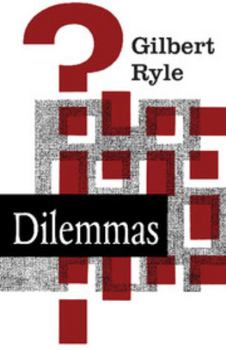Dilemmas: The Tarner Lectures 1953
(Part of the Cambridge Philosophy Classics Series)
Select Format
Select Condition 
Book Overview
Common sense tells me I can control my life to some extent; should I then, faced with a logical argument for fatalism, reject common sense? There seems to be no place in a physical theory of the... This description may be from another edition of this product.
Format:Paperback
Language:English
ISBN:0521091152
ISBN13:9780521091152
Release Date:January 1954
Publisher:Cambridge University Press
Length:136 Pages
Weight:0.40 lbs.
Dimensions:0.4" x 5.5" x 8.4"
Customer Reviews
2 ratings
More Category Mistakes
Published by Thriftbooks.com User , 22 years ago
In this short (129 pages) book, Ryle applies his idea of the Category Mistake to 7 thought-problems:1) Fatalism: If I sneezed this morning, then was it true 1000 years ago that I would sneeze this morning?2) Achilles and the Tortoise: The famous Zeno paradox where Achilles can never quite catch up, because the tortoise had a head start.3) Pleasure: I can have an acute, throbbing pain behind my eyeballs, but can I have an acute, throbbing pleasure there?4) The World of Science and the Everyday World: Which (if either) do we mean when we speak of "the real world"?5) Technical and Untechnical Concepts: If the Queen of Hearts acts as part of a Royal Flush when I play Poker, then is it the same card when I use it as a trump in Bridge?6) Perception: Sometimes I see words on a page, but other times I can also see spelling errors in the words. Which perception is more real?7) Formal and Informal Logic: Mathematics is more consistent and precise than philosophy, so we want philosophy to be more like mathematics ... right?Gilbert Ryle was the greatest at showing how our use of language affects our thinking. I can recommend this book to people who have never read him before because of the book's brevity and because of its colorful range of subjects.
Dilemmas of our own making
Published by Thriftbooks.com User , 23 years ago
Philosophy has spent the better part of its history spinning its wheels with little traction in answering some of the most perplexing and provocate issues about life. Then came Wittengenstein and the only person Wittgenstein believed truly understood his work, Gilbert Ryle (Elizabeth Anscombe should also be considered, but only Ryle is mentioned by name.) Ryle's most successful and enduring book is "Concept of Mind," which does much if not all of debunking nearly all philosophy from Descartes to date with wit, style, and grace. "Dilemmas" is a different sort of book, and in my opinion, the more enjoyable of the two. First, it's considerably shorter. Second, it goes to the heart of dilemmas that have perplexed agile and senile minds for centuries. It takes into consideration about five seemingly irresolvable problems and demonstrates how these dilemmas are neither a dilemma nor even challenging dilemmas.It what is clearly one of the best books on "deconstructing" problems that are artificial and mind games, and demonstrating how using language in its ordinary, not extraordinary, ways, Ryle shows how many philosophical problems are nothing of the sort. They are problems of language, not true problems of substance. Anyone who asks a stupid question will get a stupid answer, but Ryle goes beyond this platitude. He takes several very perplexing issues that have haunted philosophy from its nascent stages and debunks them through the use of "ordinary language." No linguistic acrobatics of the existentialist ilk, no grand metaphysics of the Scholastic ilk, no analytical positivism according to the Austrian ilk -- all of which have lead nowhere, but, instead, a refreshing reexamination of the dilemmas themselves, and clear-headed, simply examined, ordinary explanation of things in an ordinary way.This ingenious little book is not a tome of how the world looks, but is what philosophers call "techne", or "art," of how to dissolve problems that do not exist. Ryle doesn't ask and answer every question posed since the beginning of the world; rather, he takes a few isolated, but well-worked problems, and artfully and clearly shows how these "problems" aren't problems at all. They are confusions originating in linguistic abuse. Using five examples, he assumes that the reader can take with him the technique and apply it to other irrestible problems that really don't exist at all. Not that every philosophical question is a chimera in linguistic clothing, but that a substantial bulk of them are just that. In an entertaining, amusing, and charming way, Ryle uses his "techne" on five such irrestible problems and shows how they are solved. He leaves it to the reader to go from there.There are a great many good books about ordinary language philosophy, but few match the stature and eloquence of Ryle's "Dilemmas." J. L. Austin appears confused and convulated compared to Ryle, whose technique is what we learn, and in the process bring fresh insight to old problems that a





